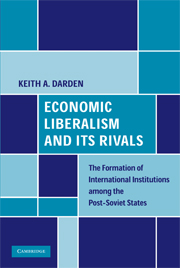 Economic Liberalism and Its Rivals
Economic Liberalism and Its Rivals Book contents
- Frontmatter
- Contents
- List of Figures and Tables
- Acknowledgments
- PART ONE THEORY AND METHODOLOGY
- PART TWO CONTINGENT SELECTION AND SYSTEMATIC EFFECTS: COUNTRY-LEVEL ANALYSES OF ELITE SELECTION, IDEATIONAL CHANGE, AND INSTITUTIONAL CHOICE, 1991–2000
- PART THREE COMPARING CASES
- 9 Alternative Explanations and Statistical Tests
- 10 Smoking Guns: A Causal History of Institutional Choice
- 11 Conclusions and Implications of the Analysis
- Appendix A Measurement and Coding of Economic Ideas – Additional Tests
- Appendix B Interviews Conducted by the Author
- Bibliography
- Index
9 - Alternative Explanations and Statistical Tests
Published online by Cambridge University Press: 29 July 2009
- Frontmatter
- Contents
- List of Figures and Tables
- Acknowledgments
- PART ONE THEORY AND METHODOLOGY
- PART TWO CONTINGENT SELECTION AND SYSTEMATIC EFFECTS: COUNTRY-LEVEL ANALYSES OF ELITE SELECTION, IDEATIONAL CHANGE, AND INSTITUTIONAL CHOICE, 1991–2000
- PART THREE COMPARING CASES
- 9 Alternative Explanations and Statistical Tests
- 10 Smoking Guns: A Causal History of Institutional Choice
- 11 Conclusions and Implications of the Analysis
- Appendix A Measurement and Coding of Economic Ideas – Additional Tests
- Appendix B Interviews Conducted by the Author
- Bibliography
- Index
Summary
We now turn directly to the challenge of rival explanations. The purpose of this chapter is to test the argument that economic ideas drive institutional choice against the dominant alternative explanations for variation in support for international trade institutions. Drawing on both qualitative evidence and a novel cross-national time-series dataset covering the post-Soviet states from 1991 to 2000, this chapter finds little support for realist and liberal arguments and partial support for nationalism/identity-based arguments and finds that the estimated role of economic ideas on institutional choice is substantively significant, statistically significant, and robust. To make this case, I first assess the existing alternative explanations theoretically and methodologically, formulate their claims as testable hypotheses, and evaluate them using qualitative comparison where appropriate. Then, moving to a discussion of the statistical tests, I describe the relevant variables used to test these approaches and detail the methods used to identify the economic ideas of the governing elite. Finally, I present and interpret the statistical results.
EXISTING EXPLANATIONS: NATIONALISM AND IDENTITY
The increasing importance of national identity in constructivist theories of international relations has naturally led some scholars to ascribe the variation in the behavior of the post-Soviet states to differences in the strength or type of nationalist sentiment. When applied to Russia, these approaches suggest that Russia carries an imperial identity that leads it to push for the creation of regional institutions to reestablish its empire.
- Type
- Chapter
- Information
- Economic Liberalism and Its RivalsThe Formation of International Institutions among the Post-Soviet States, pp. 231 - 260Publisher: Cambridge University PressPrint publication year: 2009
